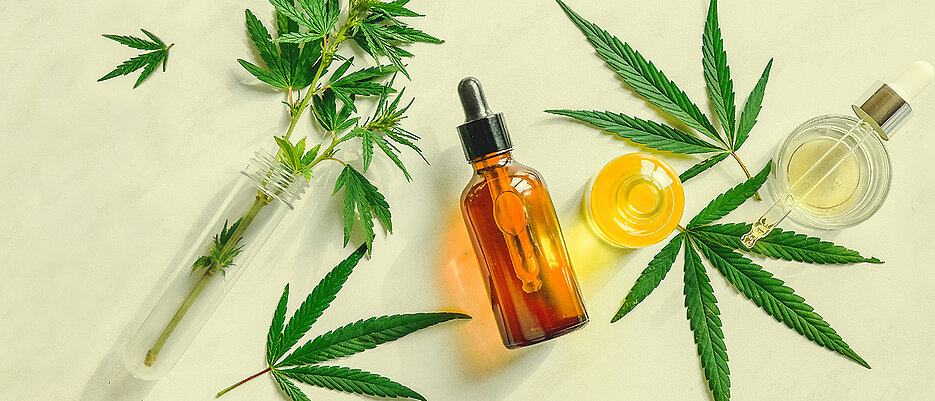CBD in Food: Dubious Benefits, Possible Risks
03/24/2025Products containing CBD are all the rage, with manufacturers advertising all kinds of positive effects. But do they really exist? A DFG working group led by Würzburg toxicologist Angela Mally has investigated this.

Whether in food supplements, chocolate, tea or jelly babies - cannabidiol (CBD) has become a lifestyle trend on the food market in recent years. CBD does not have an intoxicating effect, but manufacturers advertise a variety of positive effects: increased physical performance, an improved immune system and relief from stress, pain or menstrual cramps.
The "Food Ingredients" working group of the Senate Commission on the Health Evaluation of Foods (SKLM) of the German Research Foundation (DFG) has now carried out a scientifically sound assessment of the potential benefits of CBD and foods containing CBD - and also analysed the potential risks.
The working group is led by Professor Angela Mally from the Institute of Pharmacology and Toxicology at Julius-Maximilians-Universität Würzburg (JMU).
No Proven Benefit
For the study, which has now been published in the journal Nutrients, the researchers analysed previously published studies on the effects and side effects of CBD. The focus was on studies that looked at intake levels of up to 300 milligrams per day - above a higher dose range, CBD is used as a prescription drug, for example for epilepsy.
"After a thorough examination of the available data, we have to conclude that There is as yet no scientific basis for the frequently advertised health benefits of CBD in foods," reports Angela Mally. This applies in particular to the dosage range of less than 300 milligrams per day, which is relevant for food products.
Possible Risks Even at Low Doses
The products therefore do not deliver what they often promise, but their use is not without risk.
At the same time, the evaluation of studies focussing on adverse health effects shows that CBD can have dose-dependent and sometimes serious side effects - especially with long-term or high-dose use. These harmful effects primarily affect the liver and possible interactions with medication. In addition, the study results indicate negative effects on the nervous system, the gastrointestinal tract, the endocrine system, reproduction and fertility.
"With medicines, possible side effects are often an unavoidable side effect. Of course, this should not be the case with food," continues Mally.
CBD is usually sold in the form of oils with a CBD content of between five and 40 per cent. The British Food Standard Agency puts the acceptable daily intake at ten milligrams per day - anyone consuming oils with an average CBD content is already significantly exceeding this value. Even dosages at which the first indications of adverse health effects appeared can be reached without any problems.
Angela Mally takes an extremely critical view of this situation: "One problem is that the products often do not contain precise dosage information. Users can find all kinds of recommendations on the internet in particular and quickly dose into potentially dangerous ranges, often according to the motto 'a lot helps a lot'."
To make matters worse, the amount of CBD stated on the products and the amount actually contained often differ significantly. According to a recent study, the CBD content of commercial oils was on average around 21 per cent higher than the manufacturer's claims. Unintentional overdoses are therefore also likely.
Products Available Despite Lack of Authorisation
What is particularly curious is that no foods containing CBD are currently authorised in the EU, but they are still being sold. As novel foods, they require authorisation from the EU Commission in order to be sold. This also includes the assessment of health risks by the European Food Safety Authority (EFSA).
Despite the lack of approval, sales are made possible by legal grey areas - as products containing CBD are not marketable as foodstuffs, CBD oils are sold as flavouring oils or cosmetics instead of as foodstuffs - or regulations of varying strictness in different EU countries.
"Based on the results, we believe that there is an urgent need to inform consumers in order to create a better awareness of the dubious benefits and potential risks," emphasises Angela Mally.
Original Publication
Engeli, B. E., Lachenmeier, D. W., Diel, P., Guth, S., Villar Fernandez, M. A., Roth, A., Lampen, A., Cartus, A. T., Wätjen, W., Hengstler, J. G. & Mally, A.: Cannabidiol in Foods and Food Supplements: Evaluation of Health Risks and Health Claims. Nutrients (2025)
Contact
Prof. Dr Angela Mally, Institute of Pharmacology and Toxicology, T +49(0)931-31 81194, angela.mally@uni-wuerzburg.de






